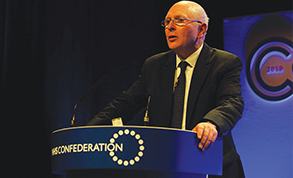Government unveils plans to tackle pension tax issue
There have been growing concerns that, facing large tax bills, clinicians are refusing to take on extra shifts, reducing their work commitments or even considering early retirement. The consultation said up to a third of hospital consultants and GPs could be affected – an HFMA briefing published in the summer said most trusts were concerned and some had developed or were considering local schemes to combat the effects on patients.
The issue relates to rules limiting the tax relief on pension growth. The annual allowance now stands at £40,000, but a taper applies to those earning more than £110,000 a year, which can see the allowance reduced to £10,000 (see Taxing problem for more).
Initially, the government suggested a 50:50 option, where employers and employees would reduce their contributions by 50%. This was rejected by the doctors’ trade union, the British Medical Association, and was withdrawn. The new government, led by Boris Johnson, vowed to find a solution through introducing more flexible contributions and by launching a Treasury review of the taper. A consultation launched today gives more details.
Under the proposals, there would be a ‘flexible accrual’ option where NHS pension scheme members can choose their accrual level and contributions in 10% increments at the beginning of the financial year.
Employers’ contributions will be reduced, but will be higher than that made by the member – the consultation acknowledges that employers must cover the cost of ancillary benefits, such as the death in service lump sum, and to meet past shortfalls.
Scheme members will also be able to fine tune their pension growth towards the end of the scheme year when there is a clearer picture of their total earnings. They will apply retrospectively from the beginning of the tax year. If they are increased, employers and members would have to pay higher contributions before the end of the tax year.
Employers will be able to choose whether to pay unused employer contributions as a non-recurrent lump sum at the end of the scheme year.
Recognising the complexity of the interaction between pay, tax and pensions, advice will be available to those affected by the pension tax issue, the consultation added.
The Department also proposed phasing in the ‘pensionabilty’ of large pay increases, which can create one-off spikes in pension growth, potentially leading to pension tax bills.
NHS Confederation chief executive Niall Dickson (pictured) said the new flexibilities ‘offered some hope’, but he insisted the issue would be addressed only by scrapping the taper on the annual allowance.
‘The repercussions for patients will only worsen without reform and the most effective way to do that would be to get rid of the taper. We need a comprehensive set of reforms that do not penalise hard-working professionals, many of whom have devoted their careers to public service in the NHS. This must include flexibilities for all staff.
‘We look forward to the outcome of the Treasury's review of how the annual allowance taper operates. In the meantime, we will continue to engage with our members so that we can represent their views in our response to the consultation.’
The BMA said the consultation was a step forward, but while its measures would help alleviate the issues they would not resolve them. ‘To succeed we need to see NHS employers doing their part and recycling all of the employer contributions,’ said Phil De Warren-Penny, BMA consultants’ committee deputy co-chair.
‘If they don’t it’s still an effective pay cut for doctors for doing extra shifts. The real heart of the problem is the tapered annual allowance, which must be removed along with the annual allowance and lifetime allowance. Only when these are removed can doctors return to working extra shifts to help remove waiting list backlogs and support colleagues where there are rota gaps, without fear of receiving huge tax bills.’
Dr De Warren-Penny added: ‘Above all, the reform needs to happen at pace. It cannot wait for the current turmoil in Parliament to be resolved and it cannot wait until doctors have been forced to reduce their hours so much, or leave the NHS altogether, that patients come to harm.’
In the HFMA briefing, finance staff said senior managers as well as clinicians were affected by the tax rules and any reform should apply to all. ‘We will be responding to the consultation on increasing flexibility of the NHS pension scheme and are keen to hear the views of HFMA members,’ said association director of policy and research Emma Knowles.
‘In our response we will be very clear that any flexibility to vary pension contributions should be available to all members of the scheme. To grant the proposed flexibility to only certain types of NHS employee is divisive and some staff on lower grades may welcome the opportunity to join the scheme and pay lower contributions.’
The consultation asks if the new flexibilities should be available to all staff or specific groups alone, such as only doctors affected by the annual allowance tax charge or affected clinicians.
The consultation closes on 1 November, but reforms cannot take effect until April 2020 as any changes require legislation. In the meantime, NHS Employers has published guidance on local schemes that can be considered to mitigate the effects of the issue.
.
Related content
We are excited to bring you a fun packed Eastern Branch Conference in 2025 over three days.
This event is for those that will benefit from an overview of costing in the NHS or those new to costing and will cover why we cost and the processes.